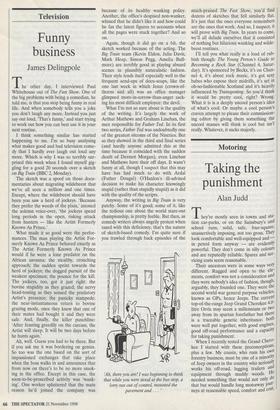Television
Funny business
James Delingpole
The other day, I interviewed Paul Whitehouse out of The Fast Show. One of the big problems with being a comedian, he told me, is that you stop being funny in real life. And when somebody tells you a joke you don't laugh any more. Instead you just say out loud, 'That's funny,' and start trying to work out how you can best use it in your next routine.
I think something similar has started happening to me. I'm so busy analysing what makes good and bad television come- dy that I hardly ever laugh out loud any more. Which is why I was so terribly sur- prised this week when I found myself gig- gling for a good 20 seconds over a sketch on Big Train (BBC 2, Monday).
The sketch was a spoof on those docu- mentaries about migrating wildebeest that we've all seen a million and one times. Except, where the wildebeest should have been you saw a herd of jockeys. 'Because they prefer the weeds of the plain,' intoned the solemn voice-over, 'the jockeys spend long periods in the open, risking attack from hunters — like the Artist Formerly Known As Prince.'
What made it so good were the perfor- mances. The man playing the Artist For- merly Known As Prince behaved exactly as The Artist Formerly Known As Prince would if he were a lone predator on the African savanna: the stealthy, crouching approach; the sudden sprint towards the herd of jockeys; the dogged pursuit of the weakest specimen; the pounce for the kill. The jockeys, too, got it just right: the bovine stupidity as they grazed; the nervy head-tossing as they sensed the predatory Artist's presence; the panicky stampede; the near-instantaneous return to bovine grazing mode, once they knew that one of their mates had bought it and they were safe. And, finally, the killer punchline: `After feasting greedily on the carcass, the Artist will sleep. It will be two days before he hunts again.'
Ah, well. Guess you had to be there. But if you ask me it was bordering on genius. So too was the one based on the sort of impassioned exchanges that take place when the boss walks in and announces that from now on there's to be no more smok- ing in the office. Except in this case, the soon-to-be-proscribed activity was 'wank- ing'. One worker spluttered that the main reason he'd joined the company was because of its healthy wanking policy. Another, the office's despised non-wanker, whined that he didn't like it and how could he fax the latest figures to accounts when all the pages were stuck together? And so on.
Again, though it did go on a bit, the sketch worked because of the acting. The Big Train team (Kevin Eldon, Julia Davis, Mark Heap, Simon Pegg, Amelia Bull- more) are terribly good at playing absurd scenes in plausibly naturalistic fashion. Their style lends itself especially well to the frequent send-ups of docu-soaps, like the one last week in which Jesus (crown-of- thorns and all) was an office manager glimpsed more-in-sorrow-than-anger sack- ing his most difficult employee: the devil.
What I'm not so sure about is the quality of the writing. It's largely the work of Arthur Mathews and Graham Linehan, the men responsible for Father Ted. In its first two series, Father Ted was undoubtedly one of the greatest sitcoms of the Nineties. But as they showed in the third and final series (and hardly anyone admitted this at the time because it coincided with the sudden death of Dermot Morgan), even Linehan and Mathews have their off days. It wasn't funny at all, though I suspect that this may have has had much to do with Ardal (Father Dougal) O'Hanlon's ill-advised decision to make his character knowingly stupid (rather than stupidly stupid) as it did with the quality of the scripts.
Anyway, the writing in Big Train is very patchy. Some of it's good; some of it, like the tedious one about the world stare-out championship, is pretty feeble. But then, as comedy writers always angrily protest when taxed with this deficiency, that's the nature of sketch-based comedy. I'm quite sure if you trawled through back episodes of the Ah, there you are! I was beginning to think that while you were stood at the bus-stop, a lony ran out of control, mounted the pavement and . . ' much-praised The Fast Show, you'd find dozens of sketches that fell similarly flat. It's just that the ones everyone remembers are the ones that work. And so, I suspect, it will prove with Big Train. In years to come, we'll all delude ourselves that it consisted of nothing but hilarious wanking and wilde- beest routines.
I'll tell you what really is a load of rub- bish though: The Young Person's Guide to Becoming a Rock Star (Channel 4, Satur- day). It's sponsored by Becks, it's on Chan- nel 4, it's about rock music, it's got sexy babes who expose their midriffs, it's set in oh-so-fashionable Scotland and it's heavily influenced by Trainspotting. So you'd think it would be pretty cool, right? Wrong. What it is is a deeply uncool person's idea of what's cool. Or maybe a cool person's craven attempt to please their commission- ing editor by giving them something the uncool masses will think is cool but isn't really. Whatever, it sucks majorly.


















































































 Previous page
Previous page